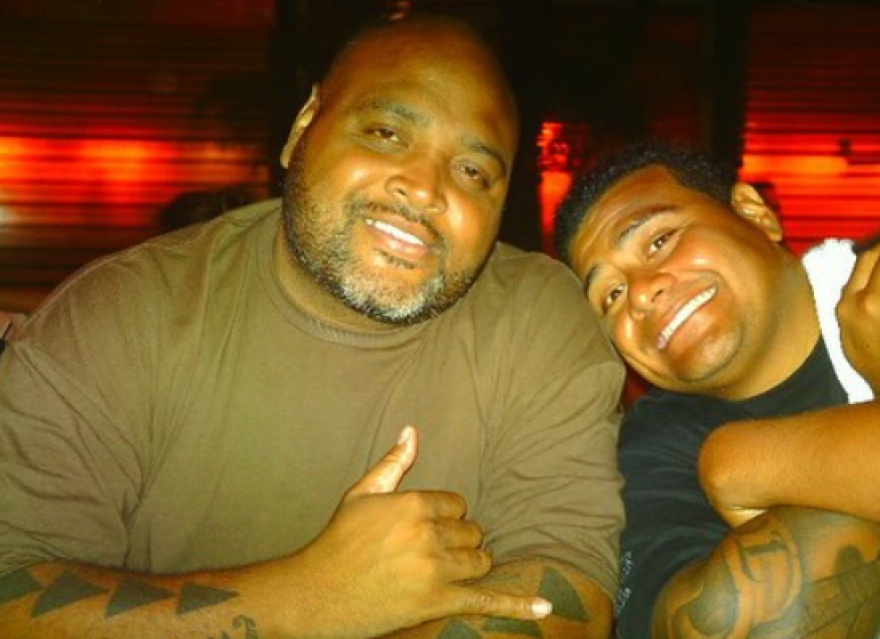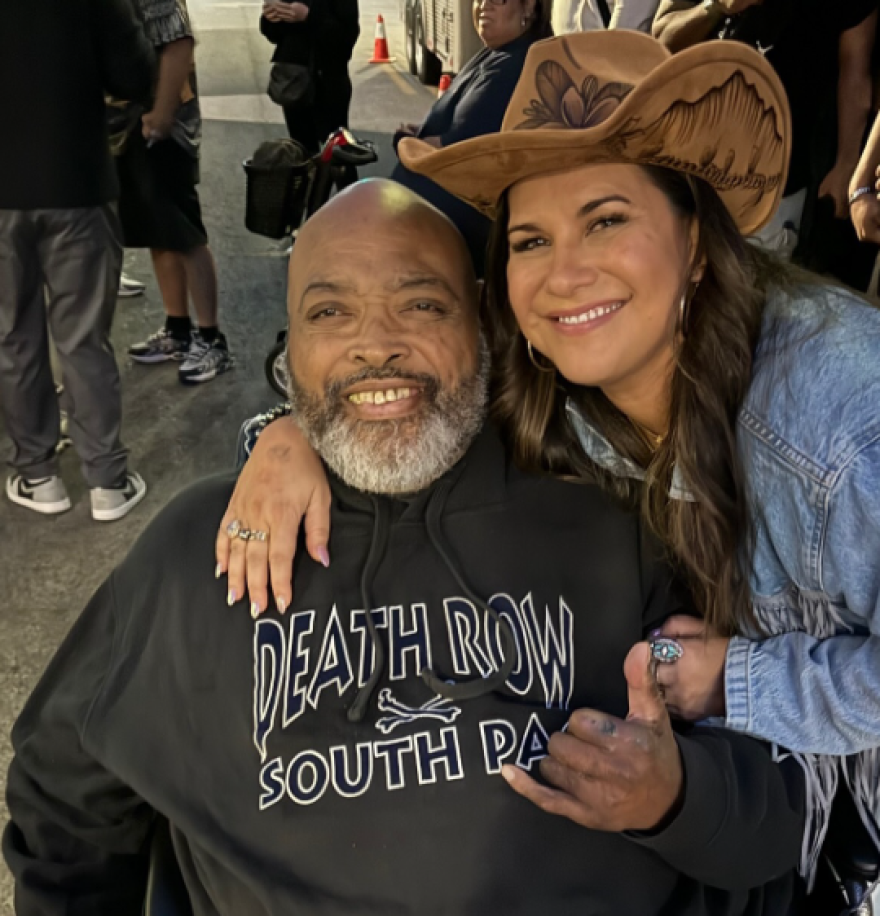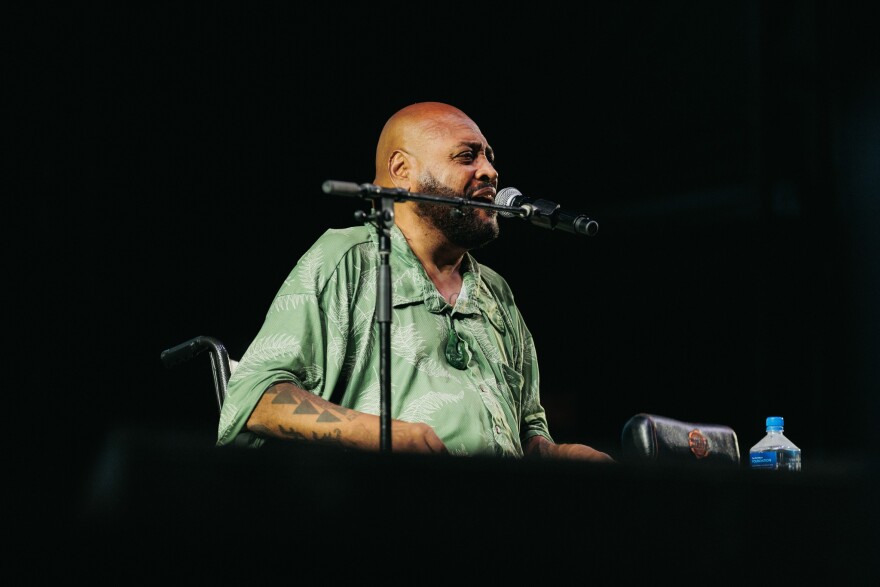George Brooks Veikoso always felt a responsibility to represent the Pacific as an Indigenous islander by staying true to himself and singing from the depths of his soul.
For nearly 40 years, the renowned musician known as Fiji has been widely recognized as the pioneer of Pacific sound, blending island influences with reggae, hip-hop, R&B, and jazz.
Veikoso, 55, died on July 23 in his home country in Suva, Fiji, while surrounded by family. The cause of death has not been announced.
In the wake of his passing, heartfelt tributes to the late musician flooded social media from his supporters, family and friends. Many described Fiji as humble, with a powerful stage presence.

California-based reggae artist Siaosi, who is Fiji's relative, said he was in disbelief when he received the call of Fiji's death from a family member. He said Fiji was one of the biggest stars to come out of the Pacific.
“Fiji was like our Michael Jackson. Fiji was like our Bob Marley,” he told HPR. “He created music that would touch generations from now to generations forward.”
Siaosi sang backup vocals for Fiji for several years, and credits him for being influential in his music career.
Fiji is technically Siaosi's grand-uncle since Siaosi's great-grandma and Fiji's grandma are sisters. But in Pacific Islander culture, calling a relative cousin is acceptable.
Siaosi said no matter how much of a rascal he was to Fiji, he would always listen to whatever advice he would give. His favorite memory of Fiji involved a karaoke night on Oʻahu.
“He could do a five-hour or five-day gig, travel around the world, and still sound flawless,” Siaosi said. “That's the only person who I've ever known that never cracked, who always sang on key, no matter what.”
Fiji's artistry is rooted in his culture. In an interview he did with Fala Talks nearly 10 years ago, Fiji said that the Pacific Island music genre “has not reached its peak yet.” He said it's a constant commitment ensuring that Pacific Islander musicians stay true to who they are rather than “selling out as a product.”
“I really want to address issues of Indigenous people — their rights, their culture and language,” Fiji said during the interview. “That's pretty much going to be my mission to the end of my life.”
In the span of his career, Fiji released at least 10 solo albums, and most of them begin with a Fijian chant or song. His musical output earned him awards like Hawaiʻi's Nā Hōkū Hanohano Awards for “Male Vocalist of the Year,” “Favorite Entertainer of the Year,” and “People's Choice Award.” Also, his collaboration “Island Warriors” compilation album earned him a Grammy nomination.
Veikoso, of Fijian and Tongan descent, came from humble beginnings. He was born in Fiji on May 10, 1970, months before the island gained independence from British colonial rule.
He was raised by a single mother in the housing settlement of Raiwaqa. His love for music came from a broken family due to his absent father.
Fiji also came from a musical family. His uncle, Sakiusa Bulicokocoko, was a Fijian jazz star, and his uncle Isireli Racule worked on Elvis Presley's song “Drums of the Islands.”
Veikoso was intentional about his stage name being Fiji to ensure that the crowd was not cheering for him, but for his home country.
He moved to Hawaiʻi in 1987, and before branching into this solo career, Fiji was part of the Hawaiian Style Band.
Native Hawaiian singer Robi Kahakalau, who was in the band with Fiji in the 1990s, described him as a musical genius.
“His major powerhouse was the production in the studio and on stage,” she said.
Kahakalau said she's been in awe of the many languages Fiji spoke: Fijian, Samoan, Tongan and various Pacific Islander dialects.
“He was a perfectionist all the way down to language pronunciation and the meaning of what he was singing,” she said.
Fijiʻs musical influence has spread across the Pacific Islands. He mentored many Pacific Islander musicians like J Boog, Common Kings, Maoli and more.

Native Hawaiian singer Kimié Miner said she had known Fiji since she was a child. In fact, her father was friends with Fiji when he was in the Hawaiian Style Band.
She said a key memory was when they were doing laundry together when she was about 20 years old. She still remembered the guidance he gave her about the music industry
“One thing he always told me is the music industry has nothing to do with music and everything to do with rights,” she said. “Make sure you take care of your rights, like your intellectual property.”
She said Fiji's music resonated with Pacific Islanders in their home islands and in the continental U.S.
“It was meaningful to us as Hawaiians and Polynesians to listen to his music,” she said. “It was the soundtrack of our lives.”
Many Pacific Islander musicians say Fiji taught them to be authentically themselves.
When California-based musician Reno Anoaʻi tried out for the national singing competition "American Idol" in 2015, he thought about how Fiji has broken down doors for Pacific Islander musicians.
A Fiji song that resonated with him was “Where Did We Go Wrong?”
“The song is acoustic, so we can really hear the rawness and emotion of Uncle Fiji,” he said. “What that song did for me was it validated my want and need to be more vulnerable in music. He broke down the stereotypes of toxic masculinity and was always vulnerable with the way he shared his story."

Fiji was open about his health in recent years while performing at concerts in a wheelchair. His death comes more than a month before he was supposed to perform at this year's Homecoming Festival in Fiji.
While Fiji has passed, his legacy still lives on through his songs that touched many lives.







